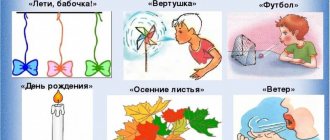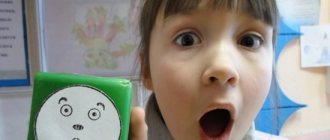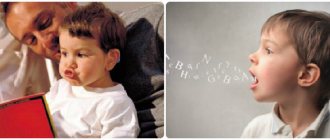10.13.2015, Norms of speech development, Commentary articles 2
The child's preparation for school has reached the home stretch. Just a little more and your preschooler will become a first-grader. This means that all the skills and abilities necessary for successfully mastering the school curriculum must be honed to perfection.
Naturally, it is best to develop a child and gradually prepare him for school from a very early age. But if for some reason you did not find the time and energy to exercise with your child, then now it is especially important to pay attention to classes in order to avoid problems with learning.
In each class there are several children who are clearly behind their peers in the school curriculum, read slower than everyone else, solve examples incorrectly and, in general, do not seem to understand how and what to do correctly in class. Such students are often teased by teachers and classmates. And even if the “underachievers” do not show their emotions about school failures, deep down they are very worried that they cannot cope with their lessons. Self-doubt arises in a child very quickly, especially in the elementary grades of school. So be sure to prepare your preschooler for the academic loads ahead!
Pay special attention to the child's speech development. After all, teachers at school, when assessing knowledge in “oral” subjects (reading, the outside world, English and almost all subjects that appear in higher grades), are guided primarily by how the child retells the material, makes a presentation, and how completely and answers without hesitation in class.
There are children who understand everything and know the answer to the teacher’s question, but cannot or are afraid to say the answer. When asked by the teacher, they remain silent or begin to say something indistinctly. Teachers perceive this as ignorance, and the child thinks that the teacher does not like him and lowers his grades. Therefore, the task of parents of children who will go to school in a year is to purposefully develop speech, the ability to retell and speak in front of the public.
Also pay attention! Going to school is very stressful for children. If your child is prone to stuttering, stutters or has stuttered before, try to prepare your preschooler as much as possible for the upcoming stress, create a calm, friendly atmosphere at home and try to get rid of stuttering before school.
Indicators of speech development of children 6-7 years old
- Normally, the vocabulary of a 6-7 year old child consists of 3,500 words (at 7 years old, the vocabulary can reach up to 7,000 words).
- The preschooler actively uses figurative expressions and metaphors (“sunny smile,” by the way, etc.). Builds grammatically correct sentences (inflects all members of the sentence according to gender, number and case). Moreover, the child can combine several simple sentences into one using the conjunctions “because”, “when”, “if” and so on.
- At this age, children love to tell stories, answer questions, and invent stories based on pictures. At the same time, during the retelling, minor details of the plot are often omitted, because all the child’s attention is concentrated on the main characters.
- A 6-7 year old preschooler can not only explain the meaning of a familiar word, but also reason about the possible meaning of unfamiliar expressions.
- The child is able to voice his emotional state and opinion about a certain situation in a conversation. Children 6-7 years old love to talk about the phenomena of life, observe what is happening and share their impressions with loved ones.
6-7 years is one of the most fertile periods, when the child already speaks well and a lot, he has something to say, and adults are interested in listening to him. In families where it was difficult for fathers to establish communication with a small child, because “what should I talk to him about?”, it is during this period that most fathers begin to enjoy talking and playing with their children.
GRAMMATICAL STRUCTURE OF SPEECH
According to the periodization of A. N. Gvozdev, at the age of five or six years, the third period of formation of the grammatical structure of the Russian language continues. At this age, children learn not only the typical forms of inflection and word formation, but also exceptions to the rules, morphemes also fall into place, and cases of word creation become fewer and fewer. Nevertheless, errors may remain in the use of forms with alternating sounds (want - want), in the use of plural forms of nouns in the nominative and genitive cases (tree - tree, pencils - no pencils), and so on. There are no or almost no participles in the speech of five-year-old children. If these forms appear in speech, they are often used incorrectly (cut, torn). There are errors in the use of prefixes with spatial meaning: morphemes that are close in meaning are mixed up, for example, entered - came, came - approached.
How to develop a child’s speech at 6-7 years old?
- The main source of speech development for a 6-year-old child, as in younger periods, remains communication with adults. Talk to your preschooler as often as possible, ask how he spent his day, discuss the books we read together, the cartoons we watched. The topic of conversation can be joint visits to the theater, circus, and exhibitions. Such activities will not only develop speech, but also broaden the child’s horizons.
- We recommend reviewing your home library and adding age-appropriate books. As a rule, 6-year-old children prefer books about the lives of animals (dinosaurs are especially attractive), adventure stories (for example, Nikolai Nosov “Dunno on the Moon”) and children's detective stories. Visit a bookstore or online store together (link to a labyrinth?) - here it might be more advisable to write a review of several books for older preschoolers and choose what the preschooler will like.
- Visit a children's library. Of course, they are not as popular now as they were during our childhood, but it is the atmosphere of the library that can interest a child in independent reading. In addition, now many children's libraries have created all the conditions to captivate children with books (comfortable reading rooms, new colorful books and even toys).
- Diversify your time together with games to develop speech. Exercises to increase your vocabulary will be especially useful.
- Teach your child to retell and speak in public without embarrassment. Oratory is a skill that will be useful and serve well throughout life. The game “school” will help you master speaking in public. Ask your child to memorize a poem or prepare a short retelling. And offer to play: “Let’s practice. Imagine that I am a teacher, and dad is a student, and you come out to recite a poem to the board.” For greater persuasiveness, dad can behave like a typical student, and you can make a voice like a teacher’s and call the child to the board.
Information portal of GBOU School No. 2009. Preschool education
There are now a lot of parents who are eager to help their children come to school well prepared. What does the concept of preparing for school include? What is the difficulty of preparing a child for school? General training— the development of speaking —begins from the child’s first birthday and continues throughout preschool childhood until he enters school, where oral speech skills are improved until the age of 12–15. To master the methods of expressive spontaneous unconscious speech (intonation of a message, a question; interjections, particles; modal words, synonyms, antonyms, etc.), it is necessary, firstly, to give the child the opportunity to hear, feel, observe how a person uses language to give his assessment reality, how he expresses his spiritual world, his emotions and feelings; secondly, to create conditions so that the child himself responds to appropriately selected linguistic means of expressive speech with emotions, feelings and exercises in expressing his own assessment of reality. When mastering expressive means of speech, language serves as a tool for the development of the emotional sphere of the child’s psyche . Speech is acquired if the following abilities are acquired:
- control the muscles of the speech apparatus, coordinate speech motor and auditory sensations;
- understand lexical and grammatical meanings;
- feel expressive shades of lexical, grammatical, phonetic language meanings;
- remember the tradition of combining linguistic units in the flow of speech, that is, learn the norm of literary speech.
In addition, when younger schoolchildren master written and improve oral speech,
- written speech is acquired if it is compared with already acquired spoken language;
— the pace of speech enrichment accelerates as the student’s speech-creating system improves.
Thus, the process of mastering written speech at school is directly dependent on preschool speech training. The natural acquisition of the native language by preschool children occurs more intensively than in later periods of development and learning. grammatical meanings twice in his life: how this happens, how to guide the education of grammatically correct speech - IN THE NEXT LECTURE (Thursday, January 26)
General speech training of preschool children, in addition to the development of oral speech, is most directly related to the development of perception and understanding of audible speech (listening), which throughout preschool age, especially in the first three years of a child’s life, significantly outstrips the development of speaking skills and has a huge impact importance in the mental development of a preschooler. To correlate a word with an object, and a phrase and a sentence with logical relationships that exist in reality, means understanding lexical and grammatical meanings.
We will talk about the stages and patterns of development of lexical skills, and the role of parents in the development of these skills in one of our next meetings. (Follow the messages)
Speech preparation of children for school is a multifaceted work; therefore, in order not to miss anything and to carry out a systematic impact on speech development, we have schematically depicted all the tasks of speech development in preschool children.
Connected speech
The concept of “coherent speech” in preschool childhood includes two components: the development of dialogic speech, i.e. the ability to conduct a conversation, the ability to communicate and, as a result, have developed communication skills. Because life teaches a child, parents and children teach, not always correctly, of course, but they communicate.
We will talk about this topic at one of the meetings; I will not talk more about the development of dialogue.
The development of monologue speech is of great concern. Let's define what a monologue is: it is 1) a retelling, 2) composing a story (orally and in writing - an essay). There are a lot of forms, so we’ll focus on the retelling.
Retelling is very often the answer in class. (Taught? Taught! Tell me!). And so, the forms of retelling: 1) close to the text (most often used); 2) a brief retelling, i.e. the child should be able to select only those facts that convey the main content; 3) retelling by roles (from the name it is clear that such a retelling is very similar to a game); 4) retelling from the hero’s point of view; 5) creative retelling: a) retelling with the addition of descriptions of the landscape, character, b) retelling with the expression of one’s attitude towards the characters of a literary work.
How to teach a child retelling?
1) read a literary work;
2) ask questions about the content. This is difficult for parents and for children, so take small works so that the children and you remember what to talk about. Questions should trace the order of actions and events in a given literary work. Pictures with a consistently developing plot can be a good help in this.
3) Rule: do not interrupt over trifles, do not go into details that did not exist or are not significant for the plot.
4) Rule: if a literary work has made a very strong impression, then the retelling may be delayed. So, for example, Pushkin's fairy tales.
5) When the child learns to retell at least a little, begin to teach him to draw up and remember a retelling plan.
6) Motivation.
If you and the child have read the text, to whom and why will it be retold? A neighbor, a dad returning from work, a grandmother. Motivation is very important.
Social skills of a six-year-old child
In the seventh year of life, children develop such important life skills as the ability to work in a team, help, sympathize, negotiate, and control their emotions. Children aged 6 years have a fairly wide social circle, they feel confident among unfamiliar people (especially in the presence of loved ones), and can carry on a conversation with adults. Six-year-olds make real friends among their peers.
The basic skills that contribute to social adaptation are formed in children during role-playing games - a generalized and simplified version of real adult life.
Signs of speech development disorder
If a child has any deviation, his speech in basic indicators will lag behind the norm. This can be determined by the following signs:
- confuses sounds by ear, has difficulty identifying them in a word;
- has difficulty mastering sound-letter analysis;
- communicates with others using simple sentences, omits prepositions;
- the agreement of words in a sentence is disrupted or there is difficulty in agreeing certain parts of speech;
- difficult to understand complex speech structures;
- has difficulty understanding hidden meanings in stories and abstract concepts;
- the number of words used in speech is limited;
- composes a story or retells it with the help of adults;
- it is difficult to understand and draw up logical chains;
- low need to communicate with others.
If by the age of 6-7 years the listed deviations in speech development are observed, it is necessary to conduct speech therapy classes and perform special exercises for this age category of children.
Gross motor skills
A six-year-old child is physically well developed. He skillfully controls his body, and his movements are quite coordinated. In the area of gross motor skills, a 6-year-old child can:
- Walk along the line and crossbar;
- Jump over obstacles;
- Stand and jump on one leg;
- Hit the ball at the target;
- Climb a rope ladder and much more.
Tasks for the development of coherent speech
During this age period, speech therapy classes pay a lot of attention to coherent speech. The lessons teach:
- compose a descriptive story using pictures;
- answer with detailed sentences;
- use prepositions and conjunctions in speech;
- write a story on a given topic.
In addition, tasks for the formation of coherent speech develop imagination and linguistic sense, which is important for further learning at school.
- The adult invites the child to compose a fairy tale together.
- Call the child a proverb and offer to explain what it is about. Then together they make up a story so that it matches the meaning of the proverb.
- The speech therapist offers children a set of words from which they need to compose sentences or a story.
At the beginning of classes, you can use pictures to compose stories. The speech therapist helps with clarifying questions. The development of coherent speech is well influenced by theatrical performances and puppet theater. In such classes you can also practice diction, develop the ability to control voice modulations and intonation expressiveness.
conclusions
So, a six-year-old child is already a fully formed personality, with his own interests and ideas about the world. He is well socialized and can follow social norms and rules. His cognitive processes are actively developing: memory, attention, thinking and speech, imagination, fine and gross motor skills are improving. Of course, we cannot talk about strict standards for the development of preschool children, but the points described in the article can serve as guidelines for parents. Indeed, in the preschool period, it is especially important to pay attention to the fact that the child is not doing as well as he would like, in order to fill in any gaps in time.
Ideas about the world around us
By the age of 6, a child has accumulated quite a lot of life experience, which forms his idea of the world around him. The baby receives a lot of information from books, cartoons, walks, conversations with adults and games with peers. A six-year-old child should know:
- Your first and last name;
- Your address;
- Parents' names;
- Seasons and their signs;
- Names of months and days of the week;
- Names of animals, birds, fish, insects, plants, vehicles, furniture, dishes, electrical appliances, etc.











